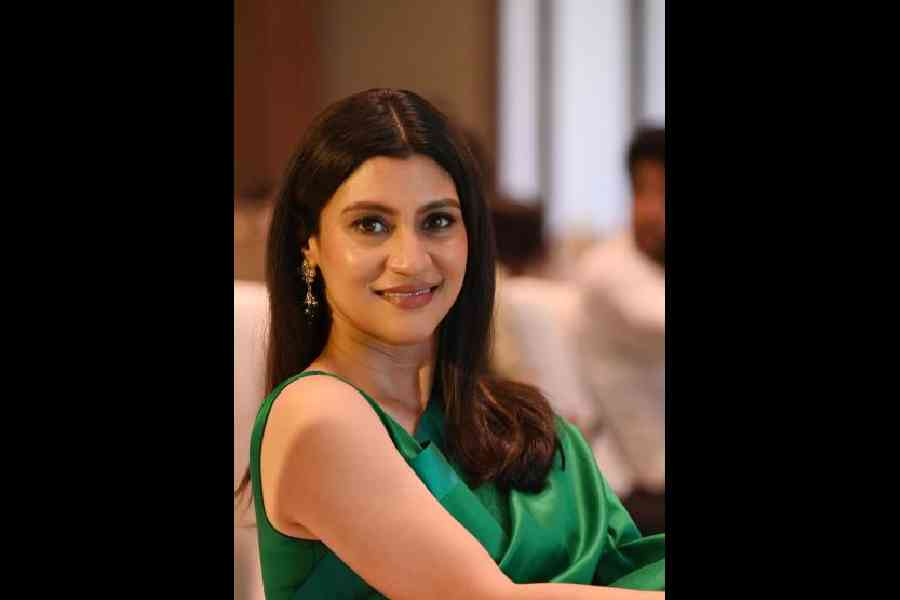Radiant in a green Raw Mango sari, Konkona Sensharma was the chief guest at a panel discussion called ‘Raising Right-Shaping Values of the Future’, as part of ITC Nimyle’s ‘Clean Equal Mission: Clean Equal Today for an Equal Tomorrow’, held at ITC Sonar, last week. We spoke to the powerhouse actor and filmmaker about instilling life lessons in children, her growing-up years and equality. Excerpts.
Konkona, you look so lovely in green! What does the colour represent for you?
Thank you so much! You know, I’m not so particular about colours, I have to say. What I really like are Indian textiles, Indian handloom, Indian fabrics, and this is such a beautiful, deep green and it’s a silk, and, yeah, I enjoy wearing some colours.
What have you learnt from the talk that you just attended?
You know, I have to say that we all have to work and we do all kinds of work. I’m just very happy when sometimes my work aligns with my values, and that doesn’t always happen sadly. And with films the thing is that one can’t always choose a film which has an issue or a message, because films are also an art form. We can’t just have instructional films, you know, just ekta message dilam, and that’s just a propaganda kind of a film. Some films are socially relevant.
I was very happy to partner with Nimyle because I felt that it is something which aligns with my values. As I was saying earlier (during the session), I’m a boy mom. I’m very aware of gender roles, gender stereotypes and the burden of patriarchy that we all bear. And I was not brought up like that. You see, I was born into a family where my upbringing has been such that we were brought up very equally. So, it’s very important to me that even my son (Haroon) is the same. I feel it’s very important for all children and for all human beings, but I’m saying here we are focusing on kids for tomorrow, on boys and girls, you know, to take care of yourself, to take care of your environment. Your body is your first home. Next is your room, your home, your community, your neighbourhood and to participate and interact with the environment with a certain consciousness and awareness, with a certain responsibility.
You know, we keep ourselves clean, we keep our environment clean. It’s not like no matter how busy we are, we always remember to brush our teeth and have a bath. Otherwise, you can’t participate in society. In a similar way, you have to extend that into the home because I don’t think we’re doing our children any favours by (saying) they are so busy in school, then they come home, they have their classes and then they have to do their studies and then you are feeding them, you set up everything and they don’t learn anything else. Then it’s not a complete human being. And when boys and girls are able to participate in the home, it gives them a sense of belonging, a sense of community and a sense of self-worth that I was able to, have the discipline and complete the task and do the same thing that the other family members are doing. I was saying this earlier... (the idea) that thik aache kore dichhi, this kind of a thing is really doing them a disservice.
One very small example... my child, wherever he goes, he will always take his plate to the kitchen and empty his waste. I hope it doesn’t get undone (laughs). Another small example... you are having a bath. Where does the towel go after that? What do you think happens to the towel? This was a conversation we had. It has to dry and it has to be back in time for your next bath. Right? Where do the clothes go from the laundry hamper? You know, this kind of education is just missing. They are getting food in boxes and packets and on their plate. Where is the rice coming from? You know, they have no idea. This is something we have to actually repeatedly inculcate and teach them, the running of the household, because that is what they will also grow up to do. Of course, cooking and cleaning. And also, not just seeing the mother do it, to see their fathers doing it as well, to see everybody participating. Children born into privilege are treated as the most important person in the family. This is a great disservice that we are doing to them... everybody is equally important and everybody has to be respected equally, including the home environment.
How old was Haroon when you started giving him life lessons?
Poor thing, I think I’ve just been doing it continuously, whenever I can (laughs). Sometimes I think he filters it out nowadays, what I’m saying. How much is going in I don’t know. But you know, I’ve also heard and I believe it’s true that it’s not just what you’re telling them. It’s what they’re seeing you do. I’ve seen my mother (actor and filmmaker Aparna Sen) who is such a successful career person, but I’ve always seen her at home. She’s a great cook. She’s very house-proud. She takes great pleasure and pride in keeping her home perfect and lovely. Even when she comes out of an aircraft, she will come out last, and we always joke and say have you cleaned everything? And it reflects your mind, you know. The mind is in a clutter, environment is in a clutter. Many a times it happens that these kids grow up to be very entitled. You know, they may have grown up in privilege, but they will open the car window, litter outside... somebody will clean up. Who’s going to do it? They become unbearable living mates.
I’m sure you’re not a mom who’s ever carried Haroon’s backpack...
The problem that was happening was that the school bags were so heavy for younger kids. That’s the issue. When Haroon was growing up, to be very honest, I saw that when he was five, six, they were giving a lot of books. So instead of having a didi who’s carrying it, we spoke to the school that why must they bring all the books back and forth... leave some books in the class, so that they can carry their own bag.
Also, you spoke about equal distribution of labour today. The atmosphere that nurtured you, how has it shaped your idea of equality?
I did college in Delhi. My formative years were in Calcutta. And, I think what made a big difference is that not just the fact that my mother was very house-proud and took equal pride in her home and her work, my father and my older sister, they have both lived abroad. So, they were very much into doing their own work, so that awareness came to me also quite young that ‘Oh, there’s really no one else there to do the work. If you don’t do it, it’s not done’.
So, for example, when my son was at an age where he could understand, at like six, seven, eight, and we had gone to visit family abroad, we had lunch and cleaned up. After dinner, he would say, ‘Again we have to clean?’ So, then the thing was, but again you’ve eaten, na? You have only eaten. You’ll only have to clean. And the fact that you have to make the food you eat.
So, this kind of awareness happened with me I think from a young age with my mom and I’ve really tried with my son as well. And my mother was also very particular about that I should have household chores, that I should be doing certain things and she tied up my pocket money to that.
What is being an equal to you today? Has your idea of equality evolved or changed?
I don’t think it’s changed for me. I think these values have been there since I was a kid. And honestly, I was brought up, I mean, the same way as a boy. I think I don’t think there’s really been any difference in the way my sister and I were brought up. There are certain family values, which I think have been passed on. And in my family, a lot of the women were working women. And when my sister chose to be a homemaker, that was given equal importance and equal respect. Women have been taught to work and to look after the home. Men have not necessarily been taught to look after the home and that is what we’re trying to change with this clean equal mission.
What are your favourite things to do in Calcutta now when you come back?
(Laughs) My sister and I were discussing... the main things are of course food, you know. Kolkata’r biryani, phuchka, ektu Nahoum-e gelam, Kookie Jar-e. I come for a short window, usually. My mother also visits Bombay, so that’s great. Aamder toh jatayat thakei.










